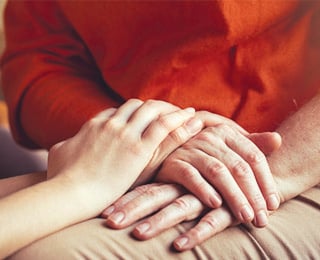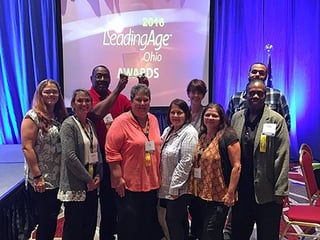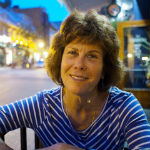Published: September 28, 2016
 People who work the night shift at a retirement community’s care center often form a special bond.
People who work the night shift at a retirement community’s care center often form a special bond.
The hustle and bustle of an active community is still, yet the needs of the sick and dying continue. Nurses and other night staff have few visitors, phone calls or other distractions to lighten the load or bring a laugh. They lean on each other, and when times are tough, they hold each other up.
That’s what happened two years ago at a nightly shift meeting at Kendal at Oberlin.
“We had experienced numerous losses of our beloved residents, some of whom had been founding residents of Kendal at Oberlin. It was truly heartwarming to share our memories and as one staff person put it, ‘This really tugs at your heartstrings.’ Thus the name of our newsletter and concept were born,” explains Tanya Phillips, night nurse manager.
Tanya and other members of the night staff--including aides, housekeepers, dining room and maintenance staff--wrote about their feelings, interviewed a resident whose husband had recently died. They shared a prayer, comfort food recipe and locations for grief support meetings. When the four-page issue of Heartstrings showed up in staff mailboxes, everyone, including administrators, were surprised.
Surprised and Comforted
CEO Barbara Thomas says the quarterly newsletter has become “an invaluable unique collection of contributions bringing comfort to readers. The newsletter provides an opportunity for education about the death and dying process and also a chance to learn about and from our night team.
“They continue to publish the newsletter, filling a void and offering comfort in unique ways to cope with the emotions we experience when facing the loss of those we love,” she wrote in a letter nominating the Heartstrings staff for an Excellence in Service Award from Leading Age Ohio.
At the annual conference in Columbus this month, Tanya and several other night staff members accepted the award.
 Tanya says the newsletter has had a profound effect on both staff and residents, many of whom have asked to be added to the mailing list.
Tanya says the newsletter has had a profound effect on both staff and residents, many of whom have asked to be added to the mailing list.
“It has given a voice to staff to express and share their personal grief experiences as well as grief experiences regarding the loss of residents. Often caregivers are expected to proceed with daily duties after the death of a resident without much thought given to them about their grief and feelings of loss.
“Heartstrings has provided the opportunity to educate staff regarding end of life care issues and quality of life improvements, and provide motivational and emotional support. As a nurse with a hospice background, education and support can provide much comfort to grieving staff and family members.
“We have had involvement from family members and residents diagnosed with progressive diseases such as Parkinson’s disease and dementia. These persons detailed their disease from the time of diagnosis, medical, physiological and social therapeutic programs with directed concerns for their own end of life care,” she explains.
Other Support for Those Grieving
For some, attending a support group and meeting others who are mourning the loss of a loved one, can be helpful and healing. Check with local churches and synagogues, hospices, hospitals and funeral homes to find a group.
The Hospice Foundation of America stresses that everyone grieves in his or her own way and may not want to get involved with a support. But the foundation lists three reasons why a support group could be helpful.
1. Validation: “Being with other grieving people can reaffirm that one is not going crazy. While every loss is unique, through support groups one can bask in the support of others who have experienced loss and understand.”
2. Time Away: “For many people, a support group can be a break from the loneliness and the boredom that often come with grief.”
3. Coping Suggestions: “By listening to stories of how others cope with a particular problem, one can find the solution that might work best.”
 In the past, Molly Kavanaugh frequently wrote about Kendal at Oberlin for the Cleveland Plain Dealer, where she was a reporter for 16 years. Now we are happy to have her writing for the Kendal at Oberlin Community.
In the past, Molly Kavanaugh frequently wrote about Kendal at Oberlin for the Cleveland Plain Dealer, where she was a reporter for 16 years. Now we are happy to have her writing for the Kendal at Oberlin Community.





